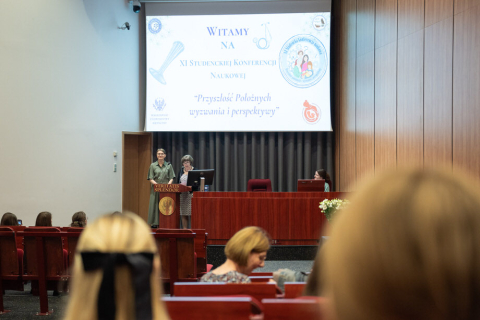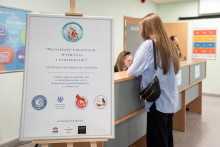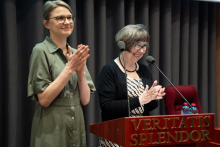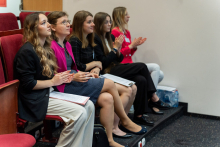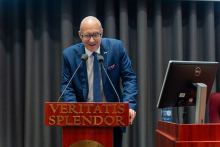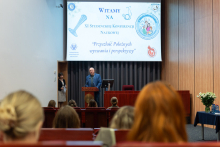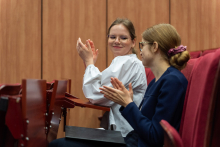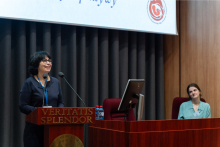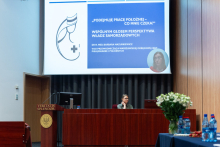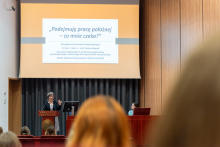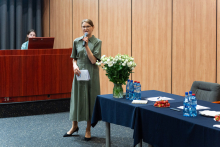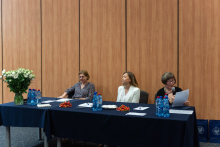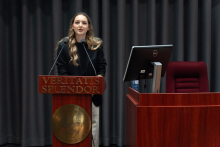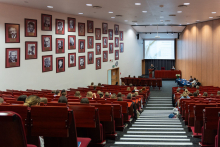This was the 11th edition of the event, hosted by the Student Ethics Research Club and the Obstetrics Student Research Group operating at the Department of Gynecology and Obstetrics Teaching. This year it was held under the title: “The future of midwives – challenges and prospects”. For years, the conference has been a platform for discussing what is current and important for the obstetrician community in Poland. And also an unwavering proof that obstetrics students and midwives want to develop professionally and conduct socially necessary research. The event was hosted by Dr. (hab.) Grażyna Bączek and Dr. (hab.) Małgorzata Stefaniak from the Department of Gynecology and Obstetrics Teaching.
Obstetrics: a beautiful and responsible field
- The field that you are or will be dealing with is a very important, but also beautiful field - said Prof. Mariusz Gujski, Dean of Faculty of Health Sciences, during the opening of the conference. The Dean reminded that obstetrics requires great discipline and responsibility: -This is a profession in which professionalism cannot be overestimated.
- I cannot imagine medicine without midwives - said Prof. Robert Gałązkowski, Vice-Dean for nutrition, medical rescue and public health at the Faculty of Health Sciences. - You are a profession that is present in the most beautiful moment of life: with the woman and the child. But it is your responsibility to ensure that the baby is born successfully.
Therefore, as the Vice-Dean emphasized, obstetrics is a field that needs to be constantly developed.
Changes and challenges facing obstetrics
Dr. Barbara Mazurkiewicz, Vice-Chair of the Warsaw District Chamber of Nurses and Midwives, and Dr. (hab.) Grażyna Bączek, Consultant in the field of gynecological and obstetric nursing for the Masovian Province, presented their perspectives.
Dr. Barbara Mazurkiewicz spoke, among other things, about the act extending the qualifications and competences of midwives with additional rights, such as blood sampling or intramuscular administration of drugs. The act has already been sent to the Ministry of Health. She also mentioned work on a project introducing changes in postgraduate education. The aim of the changes is to systematize specialization training and qualification and specialist courses, as well as to reduce their number.
- It has turned out that, in some areas, certain skills that the midwife had already obtained, for example at the master’s level, were supposed to be learned again during the training - explained the speaker.
The project also includes a proposal to change the duration of specialization training.
What challenges do midwives face from the perspective of a consultant for the Masovian Province?
According to Dr. (hab.) Grażyna Bączek, it is important, among other things, to redefine what “physiological” childbirth is. And therefore, introducing changes in the standard of perinatal care that would give the midwife independence, for example in the case of anesthetized, stimulated or induced birth. Currently, these procedures qualify such “assisted” childbirth as pathological, but in fact it is not.
The speaker also referred to the decreasing number of deliveries, asking about the necessary reorganization of maternity wards.
- We have 333 maternity wards throughout Poland, including 42 in Mazovia. there is one delivery per day in 11 of them and we have two per day in 13 ones. What then happens to the midwife’s practice? How can she improve her skills? How can she react in an unexpected situation, if it happens so rarely?” wondered Dr. (hab.) Grażyna Bączek.
Scientifically about obstetrics
After the lecture part, it was time for student presentations. There were 18 of them, divided into three sessions. The first one featured representatives of the Students’ Scientific Association for Ethics, the second one members of the Students’ Scientific Association of Midwives, and the third session (combined) was devoted to posters.
- I would like to thank the students very much for their ideas for the works and for their contribution to their performance. And for seeing the need for scientific development - said Dr. (hab.) Justyna Teliga-Czajkowska, Vice-Dean for obstetrics at the Faculty of Health Sciences.
The sessions did not take the form of a competition but the moderators decided to distinguish the best presentations.
Presentations of the 1st session:
- “Women’s intimate health – what is worth knowing about it?” – Natalia Rosół (tutor: Dr. (hab.) Małgorzata Stefaniak)
- “Sexual activity of older people from an interdisciplinary perspective” – Justyna Krysiak (tutor: Dr. (hab.) Małgorzata Stefaniak)
- The best speech: “Social media in obstetrics practice from the perspective of a cultural anthropologist” – Dr. Aleksandra Geller (tutor: Dr. (hab.) Małgorzata Stefaniak)
- The best speech: “Between vocation and burnout – analysis of the phenomenon of professional burnout in a group of Midwives in Poland – preliminary research” – Julia Kruk (tutors: Dr. Tomasz Duda and Dr. (hab.) Małgorzata Stefaniak)
Presentations of the 2nd session:
- The best speech: “The role of the midwife in educating society about reproductive health” – Saskia van den Bercken and Zofia Rokicka (tutor: Dr. (hab.) Grażyna Bączek)
- “Motivation of obstetrics students to take up studies in the profession – a review of global research” – Maja Pikosz and Adrianna Michalska (tutor: Dr. (hab.) Grażyna Bączek)
- “Managing motivation in the work of a midwife – key factors of success and professional satisfaction” – Magdalena Dębska and Joanna Romaniuk (tutor: Dr. (hab.) Grażyna Bączek)
- The best speech: “Students’ knowledge about midwives and their work”, Oksana Stępień (tutor: Dr. (hab.) Grażyna Bączek)
In the poster session, 1st place went to Maja Pikosz for her poster “Estrogen Domination”, 2nd place to Weronika Chrzanowska and Bogumiła Dobosz for “ERAS Protocol” and 3rd place to Ignacy Sakiewicz for the poster “Or maybe delivery ambulances?”. There were also two distinctions: for Maja Pikosz and Anna Cajse.
The moderators of all the sessions were impressed by quality of the presentations: both their form and originality of the topics discussed. This shows that students are involved in education and see new scientific opportunities, taking into account various social groups.
“Master Teacher” – research projects of midwives as academic teachers
Dr. Agnieszka Iwan was the first to appear. She talked about the conclusions she reached in her doctoral thesis on the effectiveness of education. Namely, in order to achieve it, the students’ satisfaction with classes is very important. It increases involvement in the educational process.
- What is important to me, as an academic teacher, is that the greater the satisfaction, the fewer students leave the university - emphasized the speaker. And she added: - It is worth measuring the degree of achieving results in the field of knowledge and skills, but student satisfaction is very important in the educational process and should be assessed well.
In turn, Anna Durka discussed her retrospective research on the impact of perinatal procedures on the quality of life of women after childbirth. She analyzed the risk factors that may lead to improper healing of a perineal wound. Based on the results, she looked for answers to the question of what actions midwives can improve to ensure proper healing. She added that the study had shown that the risk factors are different, but all of them can be modified so that there are as few consequences for patients as possible.
Finally, the speaker advised the students: - We must draw conclusions from everything we do, each aspect must be considered on many levels. Don’t admire what we did well and make do with it, but continue to improve your skills. Because these consequences will affect women, children and us.
The session ended with Magdalena Krauze presenting the issue of the model of care provided by a midwife. As she emphasized, an important element of good perinatal care is focusing on the needs of women, their children and their families. The midwife’s model of care involves monitoring the mental, physical, spiritual and social well-being of the woman, her baby and her family.
- Invariably, the place of a midwife is where women and their children are - said Magdalena Krauze - In various environments, with varying degrees of risk of complications and consequences of lack of bio-psycho-social well-being.
Midwives following this model provide women with personalized care, prevention and counseling, as well as attendance during and after childbirth, among other things. Also, they minimize unnecessary interventions and, finally, coordinate care in such a way that women requiring specialist assistance can receive it as quickly as possible.
- There is a belief that women who have not used midwifery services experience more ‘medicalized’ births, and their decisions are sometimes made accidentally, while those who had make more informed decisions and are less fearful because they are better informed. I think this is crucial - concluded the speaker.
